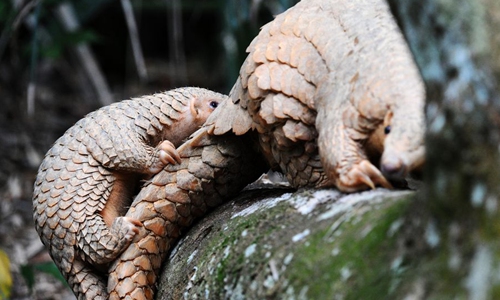
File photo shows a baby Sunda pangolin and its mother. (Photo: Xinhua)
National People's Congress (NPC) deputies have proposed an increase in penalties for the illegal trading and consumption of wildlife, and an expansion of the scope of the law to strengthen the protection of wild animals.
Li Zongsheng, an NPC deputy and founder of Anxing Law Firm in Northeast China's Liaoning Province, told the Global Times that the wildlife protection law needs to be revised to cover more species. It is also necessary to educate the public about how to protect wildlife, he said.
Deputies suggested that reptiles, as well as non-endangered land and aquatic animals that have crucial ecological and scientific attributes, be included in the protection scope.
The COVID-19 outbreak has triggered discussion about whether wild animals were the natural host of the coronavirus. Although the conclusion is not clear yet, experience from the SARS and Ebola outbreaks showed the importance of protecting wild animals and preventing zoonotic infectious diseases through legal means, Li said.
The NPC Standing Committee adopted a decision to thoroughly ban illegal wildlife trade and eliminate the bad habit of eating wild animals on the basis of the wildlife protection law during a bimonthly session on February 24.
Citing ineffective law enforcement, the deputies also advised that the government should increase penalties for the trade and exploitation of wildlife, as the current penalties are vague.
Chen Jingying, another NPC deputy who is also vice president of the East China University of Political Science and Law in Shanghai, proposed that restaurants serving wild animals should have their business certificates revoked and their businesses blacklisted, and the individuals involved should be put on record.
As many online platforms have become illegal trade venues, Chen noted that the operators of these platforms should take supervisory responsibility and be punished along with the dealers.
NPC deputy Zhu Lieyu, a lawyer from South China's Guangdong Province, specified in his proposal a penalty of up to 1,000 yuan ($143) and 10-15 days of detention for eating wild animals.
Lawmakers also called for a mechanism to report any wildlife found to be injured or dead from unknown causes and for the regular publication of a list of animals that pose a high risk of infectious diseases by the forestry and agricultural authorities.
"The procuratorial organs should strengthen communication and coordination with the forestry departments and market supervision departments to form a joint force for wildlife protection," said Deputy Li Zongsheng.


